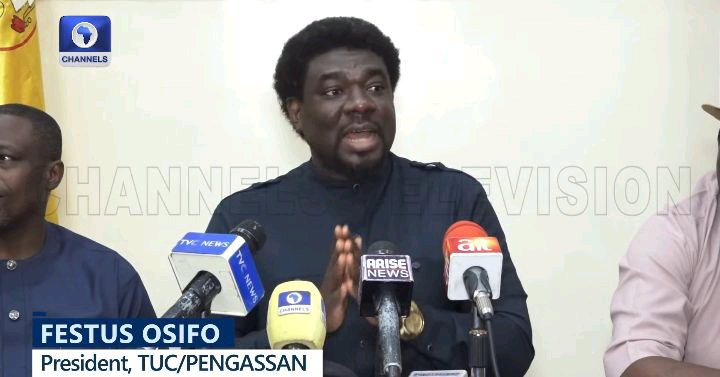In a recent press conference, Festus Osifo, the President of the Trade Union Congress (TUC), expressed his concerns regarding the caliber of individuals being elected to local assemblies in Nigeria, emphasizing the negative impact this has on governance and policy-making.
The speech video from 31:08, shared by Channels Television, offered a candid critique of both voters and political systems in the country, urging Nigerians to prioritize character and capacity over financial inducements during elections.
Osifo lamented that despite having qualified and capable candidates, many voters are swayed by the financial might of less competent contenders. He painted a vivid picture of a scenario in which an individual with exceptional qualities, such as a university lecturer earning a modest salary, is overlooked in favor of wealthy but ineffective candidates. According to him, this has led to the domination of local assemblies by individuals lacking the necessary knowledge and independence to contribute meaningfully to governance.
“We’re populating our local assemblies with ‘yes sir’ men,” Osifo remarked, highlighting how some assembly members are often sidelined and reduced to rubber-stamping the governor’s policies. He painted a troubling image of governors controlling assembly members, locking them away from debates, and ensuring that they remain silent for years. This scenario, he argued, leaves little room for dissent or genuine policy discussion.
Osifo called for a shift in how Nigerians vote, drawing comparisons with the United States, where voters make decisions based on the performance of political parties and their policies. In contrast, he observed that in Nigeria, many voters are influenced by token sums of money offered during elections, which he decried as a major factor in poor governance.
“When Trump was there, what was it costing me? Now that Biden is there, what’s the cost? People make decisions based on how they feel it in their pocket,” Osifo said, urging Nigerians to adopt a similar approach by holding their elected leaders accountable for economic performance and policy impact.
He concluded by challenging the notion that labor unions are the only entities responsible for checking bad governance. Instead, he emphasized the need for robust political parties to hold one another accountable, fostering debates on crucial issues like the economy and governance. He urged Nigerians to move beyond transactional voting, encouraging the electorate to focus on the long-term consequences of their decisions.
WHAT HE SAID
“You see three, four people contesting election or at best you see 20 people contesting election. You see a man, this man is in XYZ party, that’s relatively unknown but you know that this man is good in terms of character, intelligence and capacity. Maybe he’s a University Lecturer whose salary is 120, 000 naira but you will abandon him and run to the money bags. These are the people that will go to your Local Assembly. Not the one going to Abuja.”
“We’ll now populate our Local Assemblies with people who does not know anything, with yes sir, yes sir men, with people that the Governor will just lock in one room. They’ll be there for two years without even saying anything, then policies are now made in the state that these guys will rubberstamp. Then after all these, you’ll now say where are the Labour Unions. No sir. I don’t represent such Labour Unions. I will tell you the truth.”
“Go to America, do you even know the name of their Labour Centre? You have Political Parties checkmating themselves, you have democrats churning out policies, you have Republicans challenging them and telling them that those policies are not right. We must develop those capacities in Nigeria. You see elections, you see hot debate, you see people pursuing issues. People are voting based on the economy. You look at a product, when Trump was there what was it costing me, Biden is there now, what’s the cost. So you take decisions with how you feel it in your pocket, how it affects your family but in Nigeria we take decisions on 1,500, 2000 naira, then after you’ve taken all those decisions, and they’re implementing policies, you will now say ,no, I don’t Represent such Labour….Sêe _ Morê

